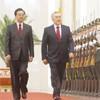Beijing bolsters status
Agence France-Presse

refid:11716692 ilişkili resim dosyası
While the rest of the world reels from the global economic crisis, China is using its deep pockets to bolster its position in strategically vital Central Asia, analysts say.In recent months Beijing has been on a spending spree in Central Asian states to its west, handing over a $10 billion loan to cash-strapped Kazakhstan in April and stepping up construction projects and investment from Ashgabat to Bishkek.
Although experts say the recent Chinese splurge is part of a long-term strategy for the region, few question the fact that Beijing's hand has never been stronger, something it is well aware of.
"It's one of the richest countries in the world, and of course in light of the crisis they're going to play the game," said Konstantin Syroezhkin, a senior research fellow at the Kazakhstan Institute for Strategic Studies. "Everyone else is in such a sorry economic state and China has money to invest."
A China expert at Almaty's Institute for Economic Strategies, Adil Kaukenov, revealingly recalls a conversation with a Chinese counterpart who told him: "We're walking all over the world with suitcases stuffed full of money, because we have to spend it."
China's investment pattern in Central Asia fits with a broader strategy that has seen Beijing snap up assets across the world in a drive to convert its massive foreign currency reserves into concrete holdings.
But for nearly two decades since the 1991 Soviet collapse, Beijing has also shown special interest in using its pocketbook to secure stability along its Central Asian border, funding infrastructure projects and investing in key sectors.
Of primary concern for Beijing is the long, porous border between Kazakhstan and China's restive Xinjiang province, says Kaukenov.
Xinjiang is home to a Muslim Uighur ethnic group feared by Beijing for its supposed separatist views - a tension critics say has resulted in human rights abuses by the region's authorities.
"China has always, since the collapse of the Soviet Union, been extremely worried that terrorists from Xinjiang would find support from the governments of Central Asia," Kaukenov said.
Now, with Russia and the United States struggling to compete in the face of domestic economic woes, China has a chance to secure the stability and assets it craves at bargain-bin prices.
Multi-million dollar infrastructure projects in Tajikistan and Kyrgyzstan - both wracked by chaos and disorder since the fall of the Soviet Union - are prime examples of China's strategy.
A win-win situation
Electrification and road projects improving the quality of life in these impoverished regions make them less likely to spawn extremists, but also open up their markets to Chinese goods - a win-win situation for Beijing.
Nargis Kassenova, a professor at the elite Kazakhstan Institute of Management, Economics and Strategic Research, or KIMEP, has researched Chinese investment and development in Kyrgyzstan and Tajikistan and detects impressive gains for Beijing.
"Tajikistan is so isolated, and to see all these Chinese companies there and the investment in Tajikistan I was pretty surprised," she said. "In pretty much all spheres now you have Chinese goods, Chinese companies.... The level of penetration is quite impressive." No single move is more emblematic than the $10 billion loan package secured by Kazakhstan, the region's beleaguered economic powerhouse.
Under the terms of the deal, the China National Petroleum Company, or CNPC, will loan up to $5 billion to Kazakh energy giant KazMunaiGas, with a further $5 billion to the Development Bank of Kazakhstan. Although Syroezhkin described the loan package as "friends helping each other out", China also received a 49 percent stake in the country's fourth-largest oil producer, MangistauMunaiGaz, as part of the deal.
"This is something that is unconditionally in their interests," he said. Others, however, are less sanguine about China's growing influence, even as they say they appreciate the assistance during a trying time for the region as a whole.
"I'm not sure about this $10 billion loan, to be honest. It's big and now we sort of owe them. Before we could say no to something but I don't know how possible it will be to say no now," said Kassenova.
















